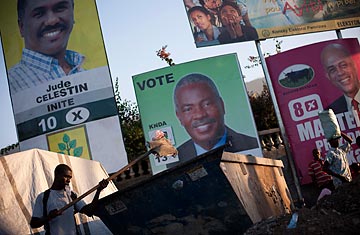
A man shovels trash into a dumpster in front of political banners for Haiti's presidential candidates in downtown Port-au-Prince November 23, 2010.
Guetty Octélene, left homeless by the earthquake that leveled Haiti last January, is living in a temporary shelter at the Corail camp north of Port-au-Prince. She's eager to vote in the presidential election on Sunday, Nov. 28. She has her voter ID card — one of the few things she didn't lose in the quake — and she's not intimidated by the growing cholera epidemic in Haiti, which has now spread to Corail. "Cholera is not going to stop me from voting," says Octélene, 40. "It's my responsibility."
But something else could prevent her. With just a few days before the balloting, Octélene doesn't yet know where she is supposed to vote. The same goes for thousands of other quake-displaced Haitians, like Benitha Mares, 25, who lives in a tent camp called Babankou near the Port-au-Prince slum of Cite Soleil with her 6-year-old son. Mares, 25, wants to vote "very early in the morning" on Sunday to avoid the crowds. But with no word yet on a polling station for the Babankou camp, she just plans to go back to the station where she used to vote — even though she suspects the quake may have destroyed it.
Despite forecasts for a low turnout, most Haitians say they want to vote. This presidential contest, they insist, is too important to pass up. Haiti's next leader won't just be responsible for disbursing some $10 billion in recovery aid from the international community; he or she will be charged with nothing less than reconstructing the western hemisphere's poorest country from its physical and institutional rubble. But that same ruin — not to mention the Haitian government's less than inspiring recovery efforts and now violent demonstrations caused by the cholera outbreak — has made it hard to convince both Haitians and the outside world that a credible election can be held. "There has certainly been a lack of confidence," admits one western diplomat in Haiti involved with the preparations.
Still, Colin Granderson, head of the Organization of American States (OAS) mission in Haiti, which is monitoring the vote along with the Caribbean Community (Caricom), insists that the election is "on track." It's "extremely important that it take place," he adds, if only to show both Haitians and the world that the country still has a civic pulse. If the voting is successful, Granderson points out, "it will be quite a boost for Haiti's psyche," he told TIME. "Haitians will have proven to themselves and the wider world that despite all the setbacks, they could still organize this." And if it's not successful? "Then most Haitians will say, 'Well, that was to be expected given all the problems.' But they know they have to attempt it."
About 4.7 million of Haiti's 10 million people were eligible to vote before the massive earthquake, which killed some 230,000 people and left 1.5 million others homeless. Much of the voter roll data was wiped out, and sorting and revising it over the past 10 months has been as monumental a task as clearing rubble. But at least one big concern — re-issuing voter ID cards — has turned out to be less nightmarish than expected, largely because it seems most Haitians had their cards on them during the temblor and didn't lose them. "The number of persons putting in requests for lost ID cards has been smaller than we thought," says Granderson, whose mission will be training an adequate number of poll monitors up until Sunday.
Getting voters like Octolene and Mars to the proper polling stations looks uncertain, however, despite $14 million in U.S. funding to educate them on that and myriad other balloting matters. Another fear is voter fraud born from the potential chaos. The Haitian electoral council, which has been working to bolster its suspect credibility in recent months, hopes to have some 40,000 poll workers at the more than 11,000 voting stations around the country's 10 provinces. But opposition candidates like Mirlande Manigat — who leads most voter polls, ahead of Jude Celestin, the choice of unpopular President René Préval — say they and their supporters will be "extra vigilant against fraud trickery," says Manigat. "For us, every election seems to bring tragedy and trauma and difficulties, but this one will require much more work on our part."
That could be especially true when it comes to election security, which is supposed to be the role of the one institution that Haitians perhaps trust the least at this moment. The cholera outbreak, which began late last month, has hospitalized more than 30,000 people and killed more than 1,500 so far — and a growing number of angry Haitians charge, fairly or not, that U.N. peacekeepers brought it to the country. (Health officials have not yet determined just how the cholera bacteria, a South Asian strain, was introduced.) In recent weeks, U.N. troops, who have — to Haitian frustration — played a mostly passive role in the months after the earthquake, have been the target of violent protests, and that could likely make it harder for them to police Sunday's election.
Regardless, the U.N. and the Preval government insist the voting will be held. And while some Haitians, including a handful among the crowded field of 19 presidential candidates, are calling for a postponement, most say it should go ahead — as should a Jan. 16 second round, since no candidate is expected to get the 50% required to win outright on Sunday. Turnout for Haiti's last presidential election, in 2006, was 60%. Officials this time say anything in the high 40s to 50s will mean a successful vote. But to achieve that, Haitians like Octélene and Mares need to know where they're supposed to deliver their ballots safely amid the rubble and the cholera.
